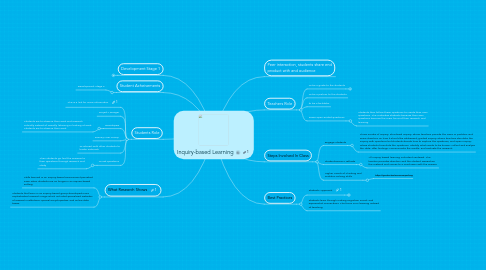
1. Development Stage 1
1.1. Define actions as necessary
2. Student Acheivements
2.1. Development Stage 2
3. Students Role
3.1. This is a link for more information
3.2. Project Manager
3.3. Developers
3.3.1. Students are to observe their work and research critically instead of casually listening or looking at work. Students are to observe their work
3.4. Primary User Group
3.5. To interact with other students to locate materials
3.6. To ask questions
3.6.1. Then students go find the answers to their questions through research and study
4. What Research Shows
4.1. Skills learned in an inquiry-based environment persisted even when students are no longer in an inquire-based setting.
4.2. Students that learn in an inquiry-based group developed more sophisticated research range which included specialized websites of research institutions, special encyclopedias, and online data bases.
5. Peer interaction, students share end product with and audience
6. Teachers Role
6.1. To be a guide to the students
6.1.1. Included
6.1.2. Included
6.1.3. Excluded
6.2. To be a partner to the students
6.3. to be a facilitator
6.4. Poses open-ended questions
6.4.1. Students then follow these questions to create their own questions. This motivates students because their own questions become the main focus of their research and learning.
7. Steps Involved In Class
7.1. Engage Students
7.1.1. Three modes of inquiry: structured inquiry, where teachers provide the issue or problem and some direction on how it should be addressed; guided inquiry, where teachers stimulate the inquiry with questions but students decide how to explore the questions; and open inquiry, where students formulate the questions, identify what needs to be known, collect and analyze the data, offer findings, communicate the results, and evaluate the research.
7.2. Student-Driven Methods
7.2.1. All Inquiry based learning is student centered. The teacher provides direction and the student researches the material and comes to a conclusion with the answer.
7.3. Higher Levels of Thinking and Problem Solving Skills
7.3.1. http://youtu.be/6OLPL5p0fMg
8. Best Practices
8.1. Students Approach
8.1.1. Developes Habits of the Mind
8.1.1.1. Persuers of information
8.1.1.2. Developes skills through questioning along with mastery of content
8.1.1.3. Ability to learn a topic with greater level of knowledge by digging deeper.
8.1.1.4. Question Oriented
8.1.2. Team Work
8.1.2.1. Peer interations
8.1.3. Duration is determined by the requirements of the unit not a set time
